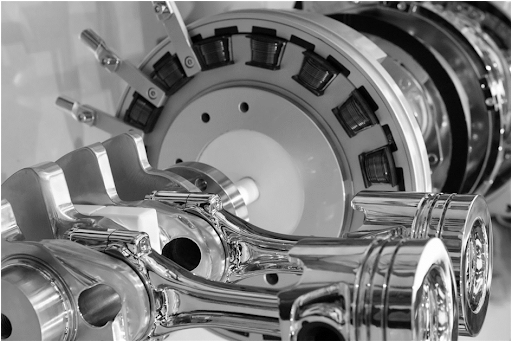All parts and mechanisms of the car are integral elements and collectively or individually play an extremely important role in the operation of a vehicle. Nevertheless, the main component of any car remains the engine. Analysis of its technical parameters allows the motorist to determine the change in traction capabilities and the ability to gain speed and work in difficult road conditions.
Among the indicators that help characterize the operation of the engine, the rotational moment, or torque, causes the most questions. What does this option affect, and how is it determined? Here are all the answers.
Table of Contents
What is Torque?
The essence of torque is easiest to explain with an example. Let’s say your car’s engine is capable of developing power within 100 hp. When driving on ordinary city roads, about 60 horsepower is used at medium speeds. At the same time, the other 40 hp remain in reserve. If you need to overtake another vehicle, you’ll have to use all 100 hp. However, this can exclusively be done gradually—first up to 70 hp, then up to 90 hp. Only when the engine reaches the peak of its revolutions, it’s possible to get all 100 hp out of it.
In such a situation, torque allows you to accelerate the set of engine revolutions during acceleration. In other words, the higher this indicator is in your car, the faster the engine revs up and the better the speed of the vehicle increases. Based on the above, it can be concluded that torque is a parameter that characterizes the force of rotation of the crankshaft. Its calculation is carried out by multiplying the force applied to the piston by the distance that separates the place of the piston attachment from the central axis of rotation of the crankshaft.
What DoesTorqueAffect?
As you know, the maximum speed of a vehicle depends on its acceleration speed. The faster the car accelerates, the faster it can reach the peak of its capabilities. In turn, acceleration is affected by engine power, which is regulated by the number of revolutions of the crankshaft. The speed with which the vehicle will gain these revolutions depends on the torque of the engine. In simple terms, the characteristic of this parameter allows you to determine how long your vehicle will be able to accelerate from zero to its maximum speed.
How to Calculate Torque?
The easiest way to find out the torque of your car is to look in the technical documents, where this parameter is prescribed in most cases. If it’s not indicated in the papers, then the data can be set using special sensors. Such devices are connected to the strain gauge station of the car and operate due to the power supply from the generator. With their help, it’s possible not only to carry out static and dynamic torque measurements but also to control the frequency of rotation of the crankshaft.
How to Increase Engine Torque?
To get the opportunity to accelerate faster, some drivers try to increase the torque of their car. This can be done in several ways. Replacing a standard muffler with a direct current muffler or installing a zero-resistance filter on the motor are considered the simplest.
Expensive and complicated methods involve internal intervention in the car engine device called “technical tuning” and require extensive experience of the tuning specialist, as well as very significant financial investments. At the same time, the difference in the operation of the car’s engine after expensive technical tuning will be very noticeable, but it’ll also have a significant effect on its motor resource. In the future, the repair of the forced-induction engine will extensively hit the pocket, if you even manage to find a repair shop that can take on such a complicated repair. All this should be done carefully so as not to get a salvage car with a burn engine.
Other expensive ways to increase engine power and torque include:
Modification or Replacement of the Air Intake System
To achieve an upgrade, there are two options: installing a zero-resistance filter or completely replacing the stock intake system. If you choose the first option, the power increase will be around 2–5% because the filter element’s resistance decreases, allowing for smoother air flow. The second option, however, can result in a more significant power increase. This is because not only does the replacement of the filter reduce resistance, but it also allows for increased intake of cold air.
Modification or Replacement of the Exhaust Gas Release System
Modern standard exhaust systems can limit the engine’s capabilities due to installed mufflers and afterburner filters. By replacing the catalytic converter with a flame arrestor and removing the particulate filter, the engine can provide an additional amount of horsepower and torque. However, this technique may not be as effective as completely replacing the standard exhaust system with a sports one. While more expensive, a sports exhaust system is made of high-quality stainless steel, ensuring its longevity is equal to the life of the car. Not only will a sports exhaust system provide a noticeable increase in power and torque, but it’ll also improve the overall performance of the car.
Use of High-Quality Consumables
Although this method cannot be classified as tuning, it’s still important and shouldn’t be overlooked. The use of high-quality and expensive consumables such as engine oil, filters, spark plugs, and fuel can directly affect both power and torque. An important aspect is the use of costly iridium or platinum spark plugs that significantly influence the performance of gasoline engines. They can not only increase power and torque but also reduce fuel consumption.
Summing Up
Understanding engine torque is crucial for any driver who wants to maximize the performance of their vehicle. Torque determines how quickly a car can accelerate and how much weight it can tow. By knowing how torque is calculated and what factors affect it, drivers can make informed decisions when choosing a car and get the most out of their driving experience. With this knowledge, motorists can also make modifications to their cars to improve torque and enjoy better performance on the road.





